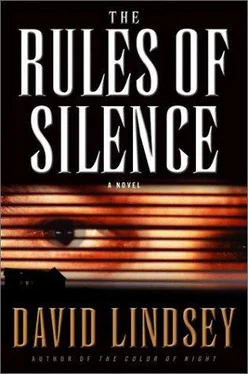David Lindsey - The Rules of Silence
Здесь есть возможность читать онлайн «David Lindsey - The Rules of Silence» весь текст электронной книги совершенно бесплатно (целиком полную версию без сокращений). В некоторых случаях можно слушать аудио, скачать через торрент в формате fb2 и присутствует краткое содержание. Жанр: Триллер, на английском языке. Описание произведения, (предисловие) а так же отзывы посетителей доступны на портале библиотеки ЛибКат.
- Название:The Rules of Silence
- Автор:
- Жанр:
- Год:неизвестен
- ISBN:нет данных
- Рейтинг книги:3 / 5. Голосов: 1
-
Избранное:Добавить в избранное
- Отзывы:
-
Ваша оценка:
- 60
- 1
- 2
- 3
- 4
- 5
The Rules of Silence: краткое содержание, описание и аннотация
Предлагаем к чтению аннотацию, описание, краткое содержание или предисловие (зависит от того, что написал сам автор книги «The Rules of Silence»). Если вы не нашли необходимую информацию о книге — напишите в комментариях, мы постараемся отыскать её.
The Rules of Silence — читать онлайн бесплатно полную книгу (весь текст) целиком
Ниже представлен текст книги, разбитый по страницам. Система сохранения места последней прочитанной страницы, позволяет с удобством читать онлайн бесплатно книгу «The Rules of Silence», без необходимости каждый раз заново искать на чём Вы остановились. Поставьте закладку, и сможете в любой момент перейти на страницу, на которой закончили чтение.
Интервал:
Закладка:
Church bells began ringing, first one and then another farther off, then another in a different direction, and still another. The air was singing with them.
Burden broke his gaze at the photograph and stood.
“I want you to remember this photograph and this story, Mr. Cain. As we decide how to address your dilemma, at some point along the way-this inevitably happens-you're going to be tempted to believe that you know best about how to extricate yourself from this ordeal that you are about to suffer. You're going to think that you don't need to listen to me, that you have better instincts for what ought to be done at some particular point or another.”
He paused a beat and almost smiled, his face taking on an expression that Titus didn't really understand and which made him uneasy.
“If you don't want me to see how your own wife might react to your death, ”he said, glancing at the photograph, “you need to listen to me. You need to do what I tell you to do… the way I tell you to do it.”
Surprised at Burden's abrupt conclusion, Titus stood, too.
“Lalia will be here in a moment to show you where you can freshen up, ”Burden said. “I'll join you downstairs for lunch in twenty minutes.”
Without any further explanation, Burden left Titus standing where he was and walked out of his study.
Chapter 12
Standing alone in the room, Titus looked again at the picture. Burden's rather creative warning was vivid and had blindsided him with its almost cruel undertone. It was unnerving, as he imagined Burden had intended it to be.
He picked up one of the books lying on a library table and read the title: The History, Culture, and Religion of the Hellenistic Age. He flipped through it and saw that the pages were heavily annotated in brown ink. He picked up another: Spanish Red: An Ethnogeographical Study of Cochineal and the Opuntia Cactus. Again heavily annotated. He bent down and looked at the book lying open, the fountain pen in its gutter: The Liar's Tale: A History of Falsehood. More marginalia in brown ink. The book next to this one had a dozen page markers sticking out of it: The Natural History of the Soul in Ancient Mexico.
Titus was surprised. He had expected to find books on intelligence systems, cryptography, international crime, terrorism, drug trade… kidnapping. None of that here. But clearly Burden had his resources. The room where the three women were working must have held a vast amount of information, and he remembered that in their telephone conversation Burden had mentioned his archives.
A shadow in the doorway caused him to look up. Lalia was standing there, smiling at him in her radiant colors. He followed her light, barefooted step around the balcony to the other side. She left him alone in a spacious bedroom where the linens smelled of lilac and the fireplace scents hinted vaguely of November fires.
While she waited outside the door on the loggia, he washed and splashed cool water on his face and combed his hair. He was tempted to call Rita-it was the dinner hour in Venice- but, again, he didn't have anything to tell her except that he was in trouble. That wouldn't do.
His neck ached, and he recognized the stiff beginnings of a tension headache. Tucking in his shirttail, he thought of the photograph of the Argentine widow and her monkey, and of how Burden had chosen to give it a position in his study that practically defined the place. Titus was sure that there was more to the picture than met the eye or that was hinted at in Burden's explication. And he was sure, too, that there was more to Garcia Burden than a lifetime of knowing him would ever allow anyone to understand.
He followed the colorful Lalia downstairs to a dining room, one entire wall of which was open to the courtyard. Sitting alone, he was served by two young Indian girls who urged him to go ahead and eat.
For a little while he enjoyed the food and beer. The echoing birdsong spilling out of the colonnades and dying into the undertones of the fountain were almost soporific, even comforting. Then, unexpectedly, this momentary peace caught in his throat like a sob, and he found himself on the verge of tears. Jesus, what was happening to him? He put down his beer and fought to control himself, baffled by the sudden burst of intense feelings. Embarrassed, he swallowed. And then swallowed again.
While he was struggling to calm himself, he saw Burden come in through the entrance corridor and enter the loggia across the courtyard. By the time he got to the dining room, Titus had reined in his wobbly emotions.
Burden sat down with him, and one of the girls brought him a plate of fruit and slices of various melons. He took one of the lime slices on the side of his plate and drizzled the juice over the melons. He ate a few bites, then picked up with their conversation as if he'd never left.
“I'll tell you an anecdote about Tano Luquin, ”Burden said quietly, chewing a bite of cantaloupe. “Just a few months before he left Colombia to avoid being caught up in Escobar's disintegration, I saw an interesting example of how he works. It was one of Escobar's contracts, Tano twice removed, of course. I was in Medellin on another matter, but I had seen enough of Tano's work by then to be able to distinguish it from all the others.
“Culturally, you know, Colombians have ardent family allegiances. They're loving and loyal to their children, aunts, and uncles, devoted to the idea of family. This is true across all levels of society. An admirable societal characteristic that any culture would be proud of. But Colombia is a culture of extremes, and this worthy quality has a perverse downside in Colombia's criminal world. When a criminal enterprise requires violence, everyone understands that to hurt a man's family is to hurt the man in the deepest way possible. So this is done with disgusting regularity and predictability.”
Burden ate some more melon, staring out to the courtyard in thought, leaning on his forearms. He went on.
“An enemy's wife is killed. His sisters, brothers, children, are ideal targets. Often there is horrible mutilation, and sometimes the man is forced to watch it all as it happens. That's always a favorite touch. It's a spiritually vicious thing, intended to destroy the man within the man, his heart of hearts. It's never enough just to kill his body. No, they want to lacerate his soul as well. And if they could figure out a way to punish him beyond death, they would send someone straight into hellfire to get the job done.
“It's fascinating to me, these Janus faces of familial devotion. One gives strength to the other, becomes, in a weird way, its raison d'etre. You just wonder why one never mitigates the other. Why do they never see the faces of their own wives or children or siblings in the faces of the people they mutilate? Why doesn't that arrest a brutish hand or…”
He shrugged and drank from his bottle of beer. “But then, that's really a human irony, isn't it. Maybe there's a peculiar Colombian twist in these instances, but they certainly aren't alone in their lack of a moral imagination. Tano isn't Colombian, but his tactics were learned there and are the same.”
One of the Indian girls floated in to check their bottles of beer to see if they wanted fresh ones. No sooner did she leave with the empty ones than the other girl arrived with the new ones, the bottles cold, a fresh lime slice sticking out of them. Burden went on.
“Well, it was in this environment that Tano Luquin came to maturity in the art of kidnapping, and then surpassed his training and became the maestro of his own kind of abduction.”
He squeezed the lime into his beer, almost reluctant to get to the anecdote about Luquin that he'd promised.
“This man-his name was Artemio Ospina-who had to be punished had three children, ”he resumed, glancing after the girl who had left the room, “all under the age of twelve. The oldest was his only daughter, and Artemio adored her for tender reasons. ”He shook his head. “Anyway, Artemio was abducted off the street and taken to his home. There he and his daughter were placed side by side and forced to watch while his wife and the remaining children were… dismembered… their body parts were… intermixed, reassembled into savage and surreal re-creations like horrible Hans Bellmer dolls.”
Читать дальшеИнтервал:
Закладка:
Похожие книги на «The Rules of Silence»
Представляем Вашему вниманию похожие книги на «The Rules of Silence» списком для выбора. Мы отобрали схожую по названию и смыслу литературу в надежде предоставить читателям больше вариантов отыскать новые, интересные, ещё непрочитанные произведения.
Обсуждение, отзывы о книге «The Rules of Silence» и просто собственные мнения читателей. Оставьте ваши комментарии, напишите, что Вы думаете о произведении, его смысле или главных героях. Укажите что конкретно понравилось, а что нет, и почему Вы так считаете.












